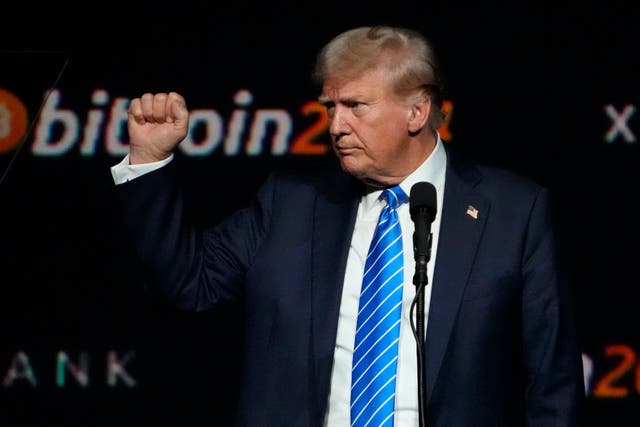A judge postponed a decision on whether to undo US President-elect Donald Trump’s conviction in his hush money case, after his lawyers called for freezing and ultimately dismissing the case so he can run the country.
New York Judge Juan M. Merchan had been scheduled to rule on Tuesday on their earlier request to throw out his conviction because of a US Supreme Court ruling this summer on presidential immunity.
Instead, he told Mr Trump’s lawyers Tuesday he would delay the ruling until November 19.
According to emails filed in court, Trump lawyer Emil Bove asked for the delay over the weekend, saying that putting the case on hold and then ending it altogether is “necessary to avoid unconstitutional impediments to President Trump’s ability to govern”.
Trump campaign spokesman Steven Cheung welcomed the delay, and said the president-elect’s win makes it “abundantly clear that Americans want an immediate end to the weaponisation of our justice system, including this case, which should have never been filed”.
Prosecutors agreed to the delay.
Mr Trump won back the White House a week ago but the legal question concerns the Republican’s status as a past president, not an impending one.
A jury convicted Mr Trump in May of falsifying business records related to a 130,000 dollar (£102,000) payment to porn actress Stormy Daniels in 2016.
The payout was to buy her silence about claims that she had sex with Mr Trump.

He says they did not, denies any wrongdoing and maintains the prosecution was a political tactic meant to harm his latest campaign.
Just over a month after the verdict, the Supreme Court ruled that ex-presidents cannot be prosecuted for actions they took in the course of running the country, and prosecutors cannot cite those actions even to bolster a case centred on purely personal conduct.
Mr Trump’s lawyers cited the ruling to argue that the hush money jury got some evidence it should not have, such as Mr Trump’s presidential financial disclosure form and testimony from some White House aides.
Prosecutors disagreed and said the evidence in question was only “a sliver” of their case.
Mr Trump’s criminal conviction was a first for any ex-president. It left him facing the possibility of punishment ranging from a fine or probation to up to four years in prison.
The case centred on how Mr Trump, 78, accounted for reimbursing his personal lawyer for the Daniels payment.
The lawyer, Michael Cohen, fronted the money. He later recouped it through a series of payments that Mr Trump’s company logged as legal expenses. Mr Trump, by then in the White House, signed most of the cheques himself.
Prosecutors said the designation was meant to cloak the true purpose of the payments and help cover up a broader effort to keep voters from hearing unflattering claims about him during his first campaign.
Mr Trump said that Mr Cohen was legitimately paid for legal services, and that Ms Daniels’ story was suppressed to avoid embarrassing Mr Trump’s family, not to influence the electorate.
Mr Trump was a private citizen, campaigning for president, but neither elected nor sworn in, when Mr Cohen paid Ms Daniels in October 2016.
He was president when Mr Cohen was reimbursed, and Mr Cohen gave evidence that they discussed the repayment arrangement in the Oval Office.
Mr Trump has been fighting for months to overturn the verdict and could now seek to leverage his status as president-elect.
Although he was tried as a private citizen, his forthcoming return to the White House could propel a court to step in and avoid the unprecedented spectacle of sentencing a former and future president.
While urging Judge Merchan to throw out the conviction, Mr Trump also has been trying to move the case to federal court.
Before the election, a federal judge repeatedly said no to the move, but Mr Trump has appealed.




Why are you making commenting on The Herald only available to subscribers?
It should have been a safe space for informed debate, somewhere for readers to discuss issues around the biggest stories of the day, but all too often the below the line comments on most websites have become bogged down by off-topic discussions and abuse.
heraldscotland.com is tackling this problem by allowing only subscribers to comment.
We are doing this to improve the experience for our loyal readers and we believe it will reduce the ability of trolls and troublemakers, who occasionally find their way onto our site, to abuse our journalists and readers. We also hope it will help the comments section fulfil its promise as a part of Scotland's conversation with itself.
We are lucky at The Herald. We are read by an informed, educated readership who can add their knowledge and insights to our stories.
That is invaluable.
We are making the subscriber-only change to support our valued readers, who tell us they don't want the site cluttered up with irrelevant comments, untruths and abuse.
In the past, the journalist’s job was to collect and distribute information to the audience. Technology means that readers can shape a discussion. We look forward to hearing from you on heraldscotland.com
Comments & Moderation
Readers’ comments: You are personally liable for the content of any comments you upload to this website, so please act responsibly. We do not pre-moderate or monitor readers’ comments appearing on our websites, but we do post-moderate in response to complaints we receive or otherwise when a potential problem comes to our attention. You can make a complaint by using the ‘report this post’ link . We may then apply our discretion under the user terms to amend or delete comments.
Post moderation is undertaken full-time 9am-6pm on weekdays, and on a part-time basis outwith those hours.
Read the rules hereLast Updated:
Report this comment Cancel